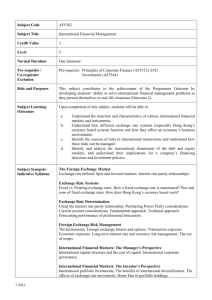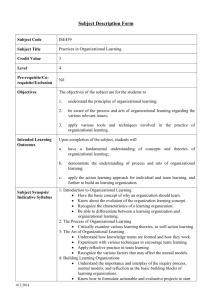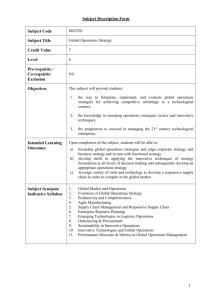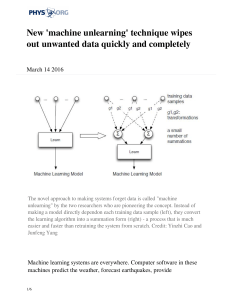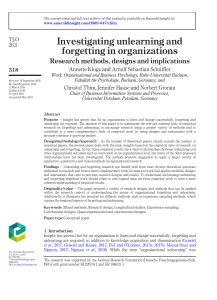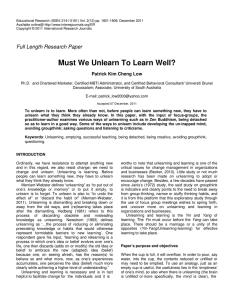ISE5600
advertisement
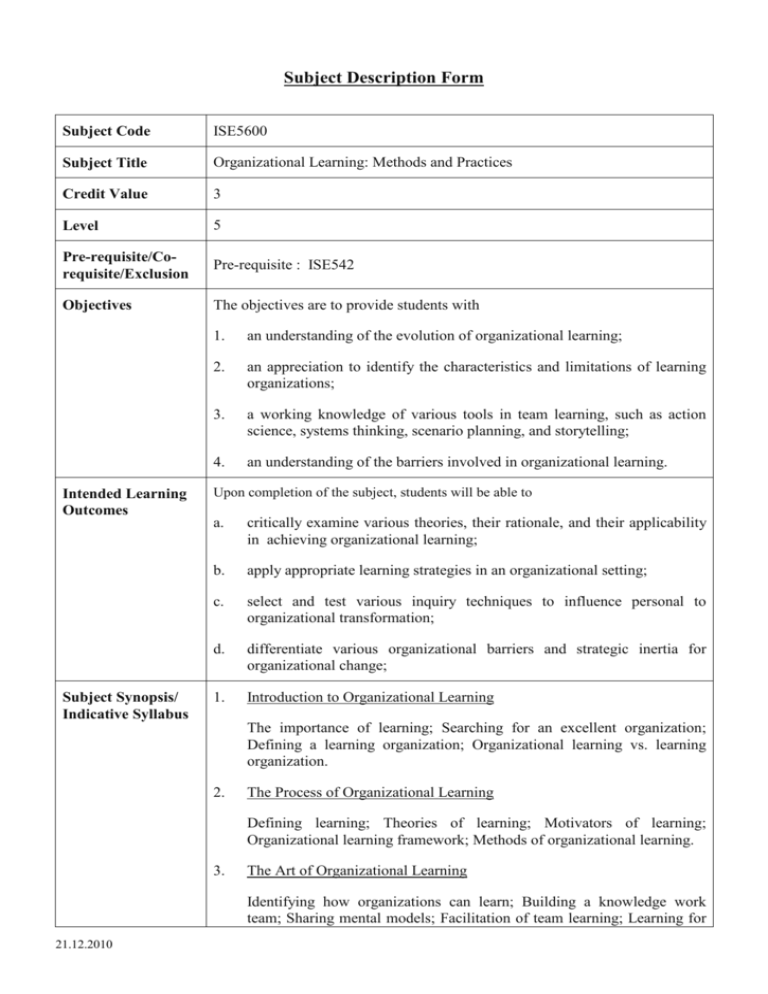
Subject Description Form Subject Code ISE5600 Subject Title Organizational Learning: Methods and Practices Credit Value 3 Level 5 Pre-requisite/Corequisite/Exclusion Pre-requisite : ISE542 Objectives The objectives are to provide students with Intended Learning Outcomes Subject Synopsis/ Indicative Syllabus 1. an understanding of the evolution of organizational learning; 2. an appreciation to identify the characteristics and limitations of learning organizations; 3. a working knowledge of various tools in team learning, such as action science, systems thinking, scenario planning, and storytelling; 4. an understanding of the barriers involved in organizational learning. Upon completion of the subject, students will be able to a. critically examine various theories, their rationale, and their applicability in achieving organizational learning; b. apply appropriate learning strategies in an organizational setting; c. select and test various inquiry techniques to influence personal to organizational transformation; d. differentiate various organizational barriers and strategic inertia for organizational change; 1. Introduction to Organizational Learning The importance of learning; Searching for an excellent organization; Defining a learning organization; Organizational learning vs. learning organization. 2. The Process of Organizational Learning Defining learning; Theories of learning; Motivators of learning; Organizational learning framework; Methods of organizational learning. 3. The Art of Organizational Learning Identifying how organizations can learn; Building a knowledge work team; Sharing mental models; Facilitation of team learning; Learning for 21.12.2010 action and change. 4. Systems Thinking: Managing Chaos and Complexity Flaws in the current mental models; “From Fragments to Connections,” a system view of complexity; Introduction to system dynamics; Soft systems thinking. 5. Scenario Learning, Storytelling, and Sense-making “The journey to social complexity, Learning from scenarios,” a storytelling organization-related and sense-making methodology. 6. Organizational Forgetting and Unlearning Understanding organizational forgetting; corporate amnesia, theories of unlearning, unlearning as a strategy for change. 7. Building Learning Organizations “The journey to becoming a learning organization,” exploring changes from personal to organizational transformation; Assessing the learning organization. Teaching/Learning Methodology The teaching will be conducted in a blended learning mode in which both faceto-face and online learning materials are used to self-directed reading. Teaching/Learning Methodologies Assessment Methods in Alignment with Intended Learning Outcomes a b Lecture Tutorial Personal Learning Environment and Network (PLEN) Specific assessment methods/tasks % weighting 1. Personal Learning Environment and Network (PLEN) 21.12.2010 Intended subject learning outcomes to be assessed c d Intended subject learning outcomes to be assessed a b c d 15% 2. Reflective Journal and Critique 30% 3. Assignment 30% 4. Test 25% Total 100% The Bulletin Board is a general online chat room to collect feedback on student learning of the subject, after which the quality of their participation is assessed. The reflective journal is a critique of what students learned in the subject; it covers all learning outcomes, except for the individual project. The assignments are reports on the action learning workshops attended by the students; they address learning outcomes (b) and (c). As for the test, students are required to integrate all their learning on the subject, and hence, all learning outcomes are involved at different extents. Student Study Effort Expected (Mixed Mode) Class contact: Face-to-face lectures/workshops/presentations 15 Hrs. 3 hours per week x 5 sessions On-line learning and Personal Learning Environment and Network (PLEN) 26 Hrs. 2 hour per week x 13 weeks Other student study effort: Directed Reading and Self Study 26 Hrs. 2 hours per week x 13 weeks Case-based Project/Assignments Total student study effort Reading List and References 40 Hrs. 107 Hrs. 1. Senge P.M. (2010). The Fifth Discipline: The Art and Practice of the Learning Organization (3rd ed.). Doubleday/Currency, New York. [Highly recommended] 2. Argyris, C. (1978). Organizational Learning: A Theory of Action Perspective. Addison-Wesley, Reading, Massachusetts. 21.12.2010




